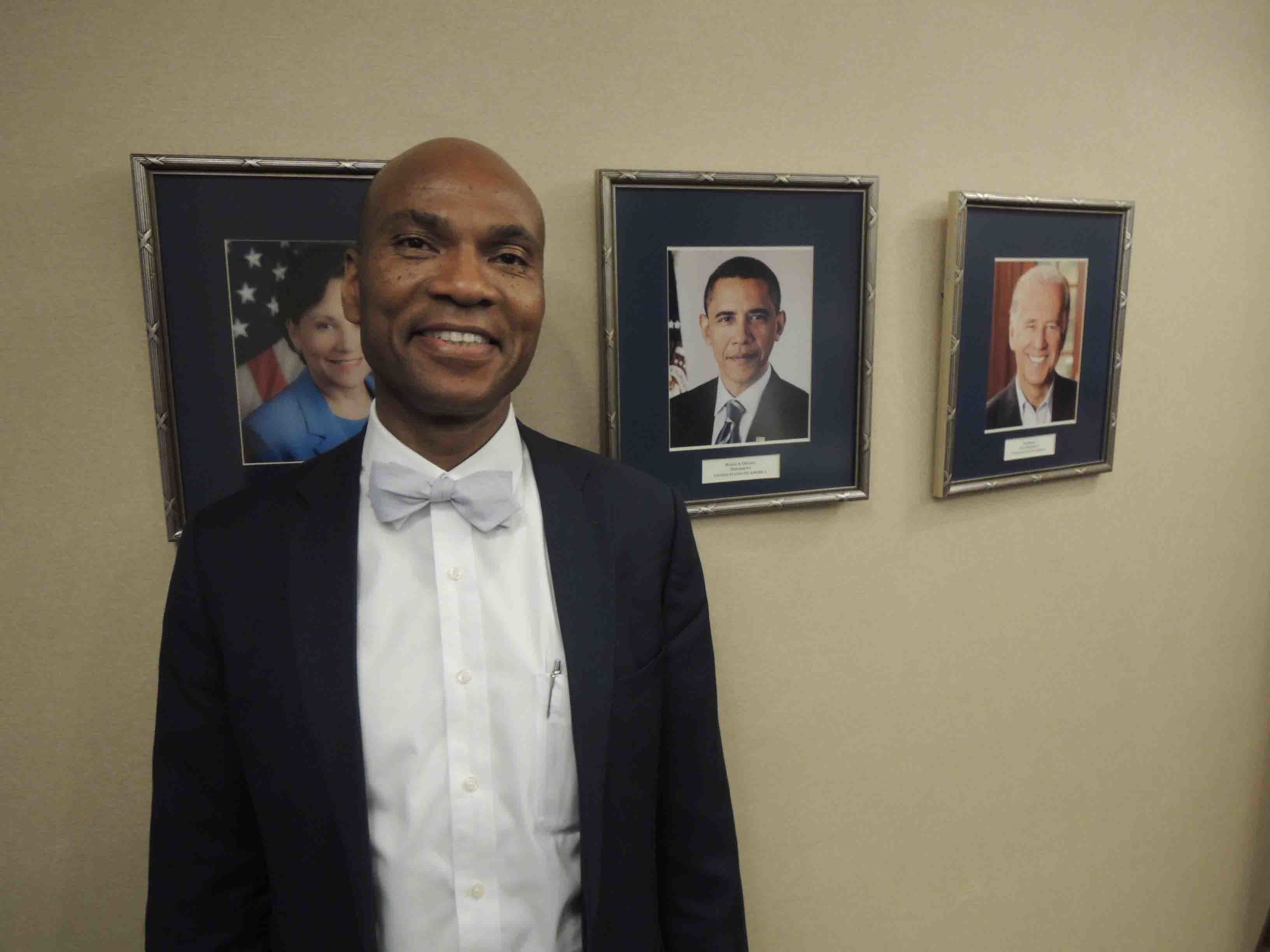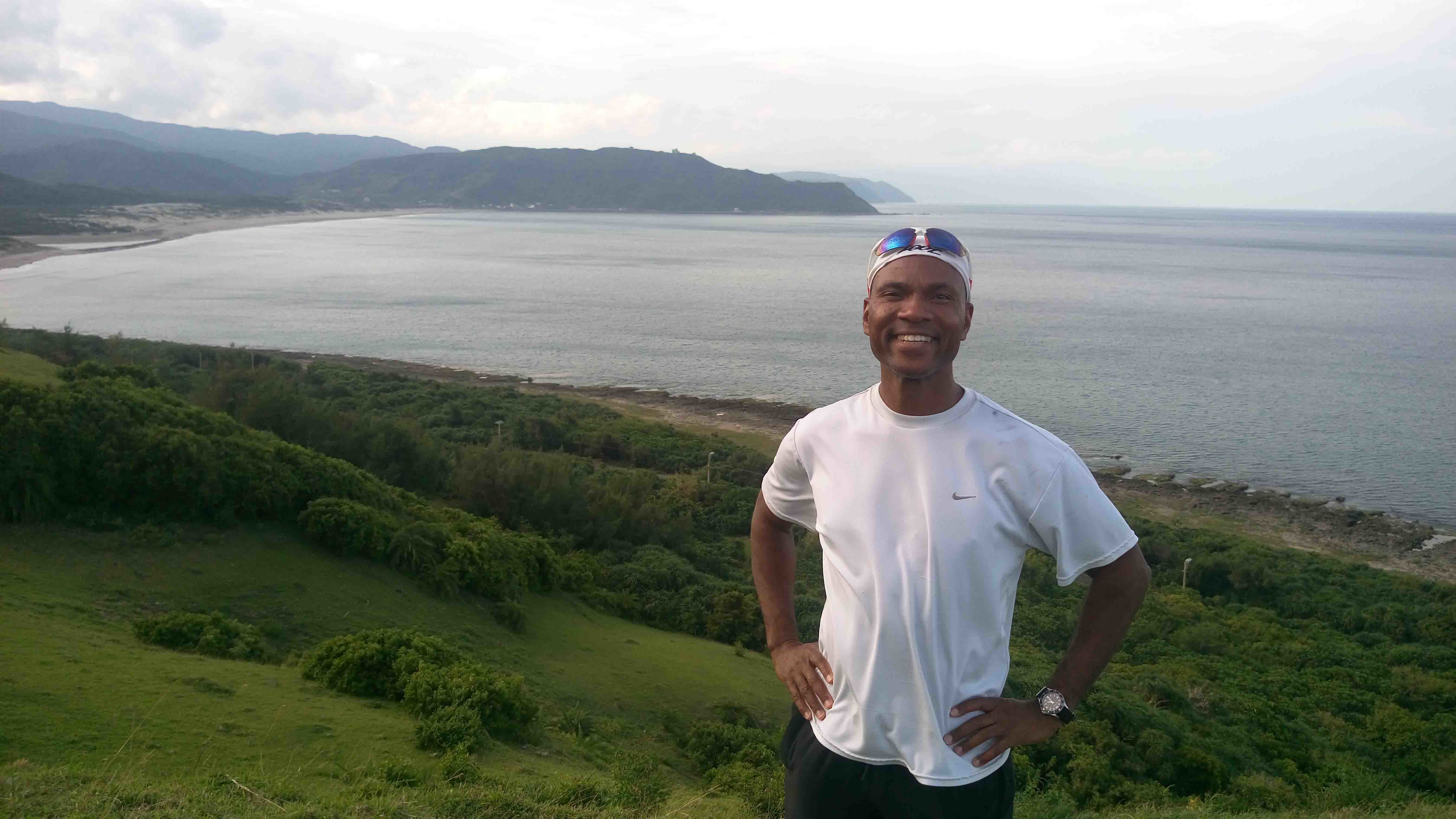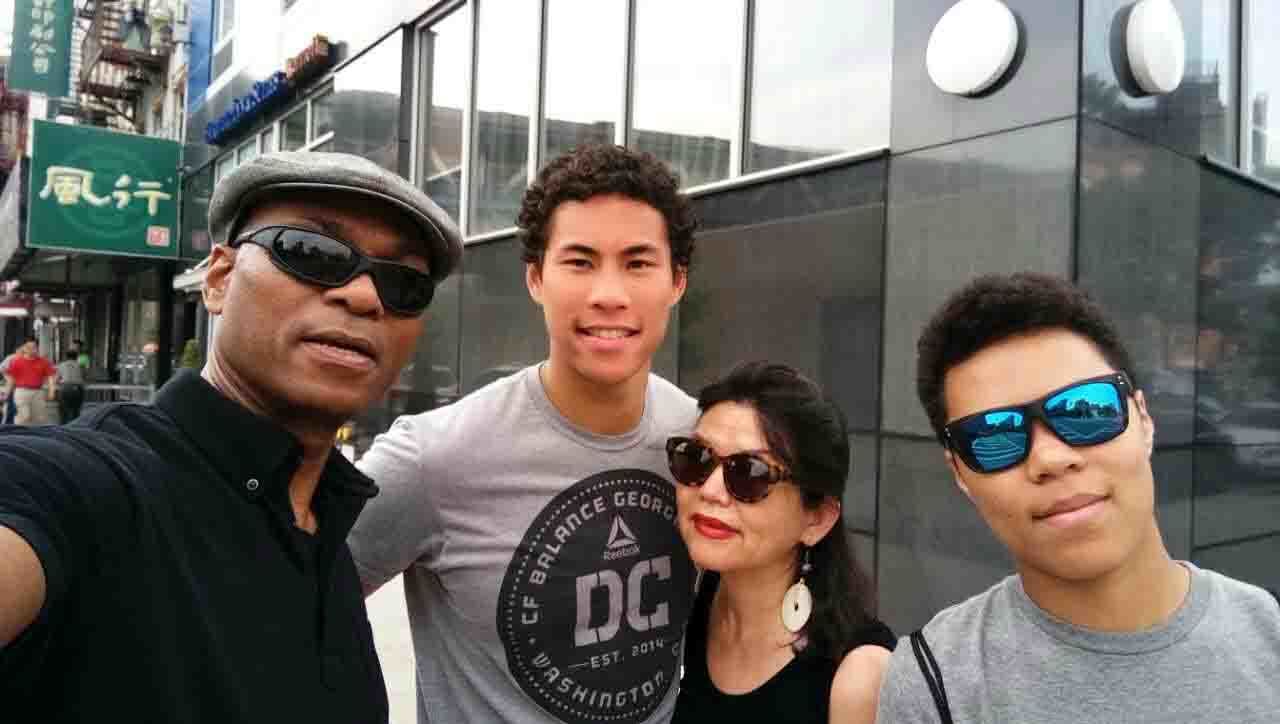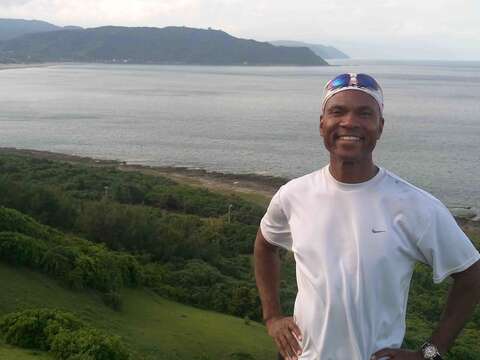Post date:2016-07-11
Updates:2016-08-23
2622
Article _ Rick Charette
Photos _ Mark Lewis

1. Mark Ashley Lewis, today the American Institute in Taiwan’s Commercial Deputy Chief, first came to Taiwan back in 1983, to study Chinese.
Mr. Mark Ashley Lewis, who hails from Washington, D.C., has been a witness to the city of Taipei’s fundamental transformation over the past 30-plus years. He has also played a role – more accurately, a number of different roles – in this transformation. He’d like to tell you his Taipei story – the city he knew then, and the metropolis he knows now.
When he arrived in Taiwan in the early 1980s, Mark was a fresh-faced youngster in his early twenties taking time off from New York’s Columbia University for intensive Chinese-language studies at National Taiwan Normal University’s Mandarin Training Center (國立台灣師範大學國語教學中心). Today he is the Commercial Deputy Chief at the American Institute in Taiwan. Let’s see how things have unfolded – in Mark’s eyes, and in his words.
Cultural Attractions
Mark is a native of Washington, D.C., and a graduate of Columbia University in the City of New York where he studied East Asian languages and cultures (BA) and engineering. Explaining what brought him to Asia, Chinese culture, and Taiwan, he says that, “When I was young, my mother would take my brother and I to plays and shows, and we’d eat in Washington’s small Chinatown before or after. As is true for many Americans, that was my first contact with ‘things Chinese.’ Then, in high school, it happened that one of my best friends was Chinese.”
“Later, at Columbia, there was a significant Chinese and Taiwanese population, notably so in my program, engineering, with more easy contact with things Chinese. In the early 1980s there was a fascination with Japan, and East Asia’s emergence. I saw that my mentor was having a great time studying Chinese linguistics and culture, thought it looked interesting, decided to take a year off, hopped on a plane, and came to Taipei for intensive studies.”
He had found himself, feeling it was a perfect fit, and after later graduating from Columbia’s East Asian Languages and Cultures program came right back to Taiwan, feeling there was opportunity here. First working with well-known American advertising firms for about 7 years, on B2B initiatives, he “felt relevant, serving as a bridge between American and Taiwanese culture,” and happy that he was working in Chinese, making “good use of my talents and my training.” Today, his role as a cultural bridge remains key to his professional life.
A Warm and Welcoming People
Mark has always found the people of Taipei and Taiwan open and broad-minded. “The Taipei of then was very different from the Taipei of today, but I’ve always felt at home. Remember, it was martial law back then,” and people were not well-traveled and as worldly as they are today. “I could count the number of black people in Taiwan on one hand,” he says, “and people would point at me as if they had discovered something new.” Some would even think he was Arabian, so rare were black visitors.
At first Mark felt a bit uncomfortable, but grew used to it, for there was friendly curiosity rather than any ill-will. “People were (and are) friendly, liked to talk and share, were always quick to help if you needed it, and were pleased you wanted to learn about Taiwan culture. My wife Crystal, who I met in 1986 after returning, was born and raised in Taiwan; a very independent thinker, my being a foreigner and black was never an issue. Her parents and siblings were supportive, especially her brother, who’d lived in New York, and simply said ‘Mark is a nice guy – and if he went to Columbia, that’s even better.’ My in-laws were very accepting, and I felt part of the family from day one. My father-in-law, a great guy, took me in as a son, and my mom-in-law had two things to say: ‘Your happiness (as a couple) is all that matters’ and ‘Mark is a little dark – but he’s OK!’”
The City – Yesterday and Today
“Taiwan was a developing economy, and not free as it is now. For me it was a great place to be. People were friendly. We didn’t have the creature comforts enjoyed now. It’s hard to remember what Taipei was like without a decent MRT, clean restrooms, and so on. There was gridlock on the buses, everywhere. It was very lacking in creature comforts, by American standards.”
“As an American, at the time – and as it is now – Taiwan folk are very welcoming of American culture. And things have picked up markedly since then. Taiwan is the US’s ninth-largest trading partner, and is a significant partner in many respects. I’ve also come a long way personally. I’ve had two sons here, and raised a family here.” Taipei is his adopted home, and his family indeed feels right at home here. “I’ve had two or three careers, moving from advertising on to journalism, heading Taiwan’s UPI o_ce. Taipei’s creature comforts have advanced to the point the city is more comfortable, in many ways, than many places (that Mark has traveled and been posted to), and even many places in the US.”

2. An avid runner who heads into the mountains almost every weekend, Mark is a member of the long-running Taipei chapter of the Hash House Harriers.
The city’s bustling commercial activity means attractive convenience. “Everything I need, normally, is available within just a few blocks, at most within no more than a mile radius. It’s hard to find that anywhere else – at least in any place that I’ve ever lived, save for New York City perhaps. Taipei is convenient, clean, safe. I can’t think of any place in the US, or anywhere else, where it’s absolutely safe to walk around in the parks at night.”
Mark rarely drives. “There’s just no need, because we have the MRT and public transportation, and taxis are ubiquitous. I do drive into the mountains, pretty much every weekend. Surrounded by green mountains – Taipei, and all of Taiwan – gives great opportunity to get out of the city and come in contact with nature.” There are always new trails and routes to run, set up each time by different members of his running club, the Hash House Harriers, a mix of locals and expats. The Harriers, with chapters in a number of Taiwan locations, have a long history in the region.
His family was away from Taiwan from 2003 to 2014, while Mark was on other postings, and on their return he found that the city had undergone fundamental changes. “Beyond running and hiking the mountain trails, a great way to exercise, there are also plenty of other things going on in Taipei. In the past, people didn’t even talk about things like hiking, biking, climbing, etc. Today, there has been a dramatic transformation in local attitudes on how to live, work, and play.”
In the past, most people spent a good deal of their leisure time indoors. A common family pastime, for his own and other families, was to rent movies to watch together. Today an abundance of outdoor recreational resources beckons. “It’s been a complete turnaround. In the past most guys in their 30s, for example, would talk exclusively about business with each other. Now, people of all ages are out there hiking and biking, and even paragliding and scuba-diving, doing all this cool stuff – I think wow, what a great place this is. So for me, I’m re-living my 20s and 30s, I’m doing all this biking and hiking, swimming, rock-climbing, river tracing ….”
3. The Lewis family; Mark met his wife Crystal in late 1986, and they were wed the very next year.
wed the very next year.
Taipei, Garden City
Mark agrees with the characterization of Taipei as a Garden City. “Yes, I do agree,” he states, “especially because of my involvement in running and hiking activities. It’s a perfect place – you can take the subway right to the park, or to spots where you can start climbing a mountain.” Reflecting a short time a_er being asked if he has any favorite spots in the city, he replies that he has no favorite trails. He routinely runs the trails around Beitou’s Battleship Rock (軍艦岩), near his home. What gives him pleasure in this regard is simple, he says, trails with “easy grades and without obstacles” – and Taipei offers them aplenty.
“Oddly enough,” he continues, “as much time as I’ve spent there, I still really enjoy Yangmingshan – just being there.”Yangmingshan National Park, much of which falls within city limits, takes up the upper portion of the Yangmingshan massif on Taipei’s north side. Mark especially enjoys Yangmingshan’s Xiaoyoukeng (小油坑), renowned for its fumaroles, sulfur-crystal deposits, hot springs, and “landslide terrain” formed by post-volcanic activity, and savors the area’s “outdoor natural hot springs, which are very pleasant; it’s a very nice place, especially in winter, with its wild, natural hot springs, nothing fancy.”
He used to go to Muzha frequently to visit the tea farms and their rustic teahouses in the Maokong (貓空) area, soaking in the terraced tea-_eld scenery and far-off views of the city, though he has not had the time of late. “It’s very nice to go there for tea
or co_ee, and just relax. Time stops. I find it very restful.”
As a final note, Mark approaches the Garden City theme from a different angle, discussing how good the food is here, and how so much of the ingredients used here are same-day fresh. “After living in mainland China, for example, I appreciate the freshness of the food, the safety, the reliability, and the way it’s prepared here. The people of Taipei and Taiwan spend a lot more time, and pay a lot more attention, than you find at restaurants elsewhere.
“Life is very comfortable here.”
Photos _ Mark Lewis

1. Mark Ashley Lewis, today the American Institute in Taiwan’s Commercial Deputy Chief, first came to Taiwan back in 1983, to study Chinese.
Mr. Mark Ashley Lewis, who hails from Washington, D.C., has been a witness to the city of Taipei’s fundamental transformation over the past 30-plus years. He has also played a role – more accurately, a number of different roles – in this transformation. He’d like to tell you his Taipei story – the city he knew then, and the metropolis he knows now.
When he arrived in Taiwan in the early 1980s, Mark was a fresh-faced youngster in his early twenties taking time off from New York’s Columbia University for intensive Chinese-language studies at National Taiwan Normal University’s Mandarin Training Center (國立台灣師範大學國語教學中心). Today he is the Commercial Deputy Chief at the American Institute in Taiwan. Let’s see how things have unfolded – in Mark’s eyes, and in his words.
Cultural Attractions
Mark is a native of Washington, D.C., and a graduate of Columbia University in the City of New York where he studied East Asian languages and cultures (BA) and engineering. Explaining what brought him to Asia, Chinese culture, and Taiwan, he says that, “When I was young, my mother would take my brother and I to plays and shows, and we’d eat in Washington’s small Chinatown before or after. As is true for many Americans, that was my first contact with ‘things Chinese.’ Then, in high school, it happened that one of my best friends was Chinese.”
“Later, at Columbia, there was a significant Chinese and Taiwanese population, notably so in my program, engineering, with more easy contact with things Chinese. In the early 1980s there was a fascination with Japan, and East Asia’s emergence. I saw that my mentor was having a great time studying Chinese linguistics and culture, thought it looked interesting, decided to take a year off, hopped on a plane, and came to Taipei for intensive studies.”
He had found himself, feeling it was a perfect fit, and after later graduating from Columbia’s East Asian Languages and Cultures program came right back to Taiwan, feeling there was opportunity here. First working with well-known American advertising firms for about 7 years, on B2B initiatives, he “felt relevant, serving as a bridge between American and Taiwanese culture,” and happy that he was working in Chinese, making “good use of my talents and my training.” Today, his role as a cultural bridge remains key to his professional life.
A Warm and Welcoming People
Mark has always found the people of Taipei and Taiwan open and broad-minded. “The Taipei of then was very different from the Taipei of today, but I’ve always felt at home. Remember, it was martial law back then,” and people were not well-traveled and as worldly as they are today. “I could count the number of black people in Taiwan on one hand,” he says, “and people would point at me as if they had discovered something new.” Some would even think he was Arabian, so rare were black visitors.
At first Mark felt a bit uncomfortable, but grew used to it, for there was friendly curiosity rather than any ill-will. “People were (and are) friendly, liked to talk and share, were always quick to help if you needed it, and were pleased you wanted to learn about Taiwan culture. My wife Crystal, who I met in 1986 after returning, was born and raised in Taiwan; a very independent thinker, my being a foreigner and black was never an issue. Her parents and siblings were supportive, especially her brother, who’d lived in New York, and simply said ‘Mark is a nice guy – and if he went to Columbia, that’s even better.’ My in-laws were very accepting, and I felt part of the family from day one. My father-in-law, a great guy, took me in as a son, and my mom-in-law had two things to say: ‘Your happiness (as a couple) is all that matters’ and ‘Mark is a little dark – but he’s OK!’”
The City – Yesterday and Today
“Taiwan was a developing economy, and not free as it is now. For me it was a great place to be. People were friendly. We didn’t have the creature comforts enjoyed now. It’s hard to remember what Taipei was like without a decent MRT, clean restrooms, and so on. There was gridlock on the buses, everywhere. It was very lacking in creature comforts, by American standards.”
“As an American, at the time – and as it is now – Taiwan folk are very welcoming of American culture. And things have picked up markedly since then. Taiwan is the US’s ninth-largest trading partner, and is a significant partner in many respects. I’ve also come a long way personally. I’ve had two sons here, and raised a family here.” Taipei is his adopted home, and his family indeed feels right at home here. “I’ve had two or three careers, moving from advertising on to journalism, heading Taiwan’s UPI o_ce. Taipei’s creature comforts have advanced to the point the city is more comfortable, in many ways, than many places (that Mark has traveled and been posted to), and even many places in the US.”

2. An avid runner who heads into the mountains almost every weekend, Mark is a member of the long-running Taipei chapter of the Hash House Harriers.
The city’s bustling commercial activity means attractive convenience. “Everything I need, normally, is available within just a few blocks, at most within no more than a mile radius. It’s hard to find that anywhere else – at least in any place that I’ve ever lived, save for New York City perhaps. Taipei is convenient, clean, safe. I can’t think of any place in the US, or anywhere else, where it’s absolutely safe to walk around in the parks at night.”
Mark rarely drives. “There’s just no need, because we have the MRT and public transportation, and taxis are ubiquitous. I do drive into the mountains, pretty much every weekend. Surrounded by green mountains – Taipei, and all of Taiwan – gives great opportunity to get out of the city and come in contact with nature.” There are always new trails and routes to run, set up each time by different members of his running club, the Hash House Harriers, a mix of locals and expats. The Harriers, with chapters in a number of Taiwan locations, have a long history in the region.
His family was away from Taiwan from 2003 to 2014, while Mark was on other postings, and on their return he found that the city had undergone fundamental changes. “Beyond running and hiking the mountain trails, a great way to exercise, there are also plenty of other things going on in Taipei. In the past, people didn’t even talk about things like hiking, biking, climbing, etc. Today, there has been a dramatic transformation in local attitudes on how to live, work, and play.”
In the past, most people spent a good deal of their leisure time indoors. A common family pastime, for his own and other families, was to rent movies to watch together. Today an abundance of outdoor recreational resources beckons. “It’s been a complete turnaround. In the past most guys in their 30s, for example, would talk exclusively about business with each other. Now, people of all ages are out there hiking and biking, and even paragliding and scuba-diving, doing all this cool stuff – I think wow, what a great place this is. So for me, I’m re-living my 20s and 30s, I’m doing all this biking and hiking, swimming, rock-climbing, river tracing ….”
3. The Lewis family; Mark met his wife Crystal in late 1986, and they were
 wed the very next year.
wed the very next year.Taipei, Garden City
Mark agrees with the characterization of Taipei as a Garden City. “Yes, I do agree,” he states, “especially because of my involvement in running and hiking activities. It’s a perfect place – you can take the subway right to the park, or to spots where you can start climbing a mountain.” Reflecting a short time a_er being asked if he has any favorite spots in the city, he replies that he has no favorite trails. He routinely runs the trails around Beitou’s Battleship Rock (軍艦岩), near his home. What gives him pleasure in this regard is simple, he says, trails with “easy grades and without obstacles” – and Taipei offers them aplenty.
“Oddly enough,” he continues, “as much time as I’ve spent there, I still really enjoy Yangmingshan – just being there.”Yangmingshan National Park, much of which falls within city limits, takes up the upper portion of the Yangmingshan massif on Taipei’s north side. Mark especially enjoys Yangmingshan’s Xiaoyoukeng (小油坑), renowned for its fumaroles, sulfur-crystal deposits, hot springs, and “landslide terrain” formed by post-volcanic activity, and savors the area’s “outdoor natural hot springs, which are very pleasant; it’s a very nice place, especially in winter, with its wild, natural hot springs, nothing fancy.”
He used to go to Muzha frequently to visit the tea farms and their rustic teahouses in the Maokong (貓空) area, soaking in the terraced tea-_eld scenery and far-off views of the city, though he has not had the time of late. “It’s very nice to go there for tea
or co_ee, and just relax. Time stops. I find it very restful.”
As a final note, Mark approaches the Garden City theme from a different angle, discussing how good the food is here, and how so much of the ingredients used here are same-day fresh. “After living in mainland China, for example, I appreciate the freshness of the food, the safety, the reliability, and the way it’s prepared here. The people of Taipei and Taiwan spend a lot more time, and pay a lot more attention, than you find at restaurants elsewhere.
“Life is very comfortable here.”
 TAIPEI 2016Summer Vol.04—Mark Lewis and His Second Home An American Diplomat’s Taipei Story
TAIPEI 2016Summer Vol.04—Mark Lewis and His Second Home An American Diplomat’s Taipei Story



